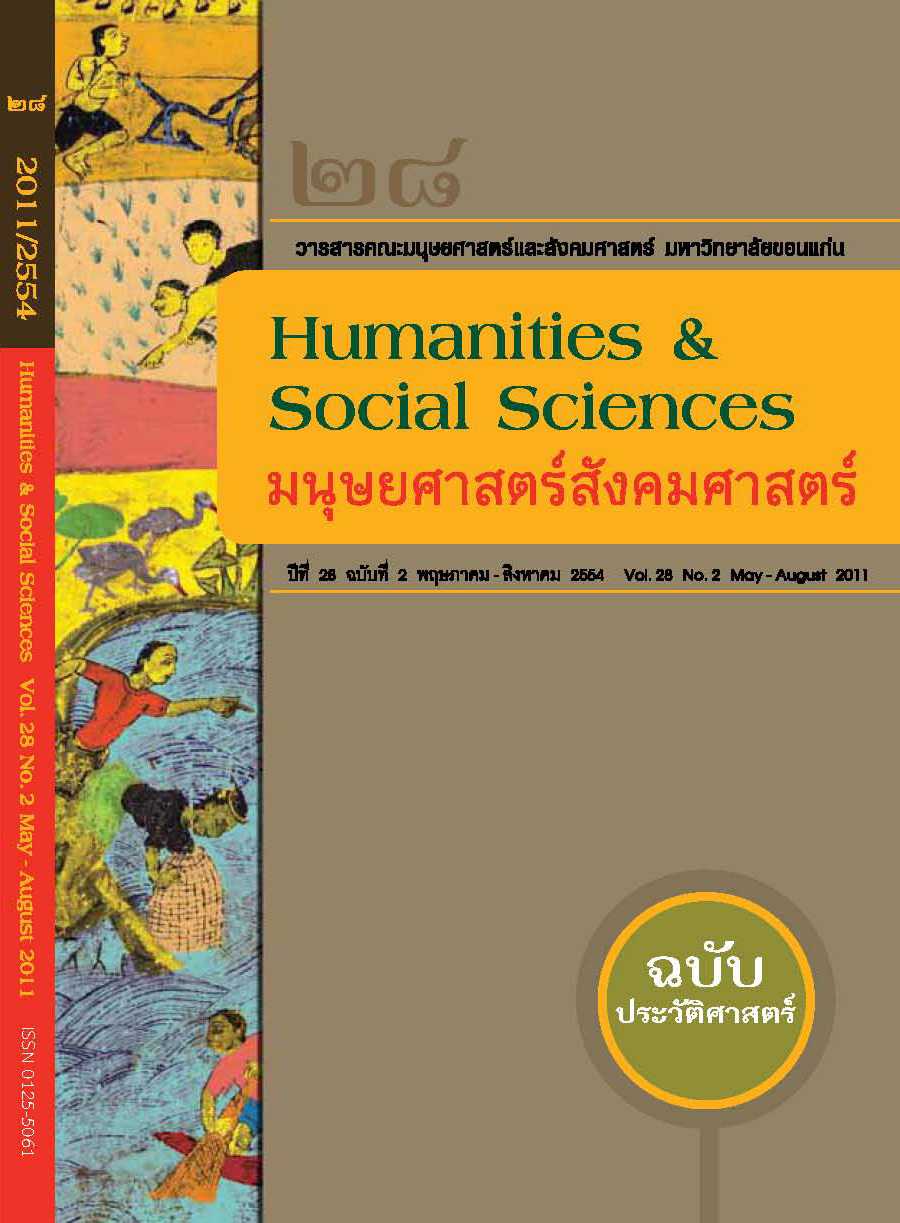วาทกรรม “บุญนิยม”: กรณีศึกษาชุมชนราชธานีอโศก จังหวัดอุบลราชธานี
Keywords:
วาทกรรม, นิจภาพ, ชุมชนราชธานีอโศก, Discourse, Habitus, Ratchathani Asoke CommunityAbstract
บทคัดย่อ
งานวิจัยเรื่อง “วาทกรรม “บุญนิยม”: กรณีศึกษาชุมชนราชธานีอโศก จังหวัดอุบลราชธานี” มีวัตถุประสงค์ในการศึกษาประการแรกคือ เพื่อศึกษาบทบาทของภาษาในการสร้างอุดมการณ์และวาทกรรมบุญนิยม ให้เกิดขึ้นในกลุ่มของชาวชุมชนราชธานีอโศก ประการที่สอง เพื่อศึกษานิจภาพของชาวชุมชนที่ทำให้เกิดภาคปฏิบัติการจริงของวาทกรรม “บุญนิยม” ของชาวชุมชนราชธานีอโศก ตามแนวคิดนิจภาพของ ปิแอร์ บูร์ดิเยอ วิธีในการศึกษาครั้งนี้ประกอบด้วย การศึกษาข้อมูลจากเอกสาร การสัมภาษณ์ และการสังเกตแบบมีส่วนร่วม
ผลการศึกษาพบว่า ภาษาเข้ามามีบทบาทในการสร้างและคงไว้ซึ่งอุดมการณ์และวาทกรรม “บุญนิยม” คำศัพท์ที่เกี่ยวกับอุดมการณ์“บุญนิยม” ได้ถูกสร้างขึ้นใน 3 ด้านคือ (1) คำศัพท์เกี่ยวกับแนวคิดหลัก (2) คำศัพท์ด้านเศรษฐกิจ และ (3) คำศัพท์ด้านสังคม คำศัพท์ต่างๆ เหล่านี้ถูกนำไปใช้ภายในชุมชนในการสื่อสารแบบทั้งที่เป็นทางการและไม่เป็นทางการได้แก่ การเทศน์ของสมณะโพธิรักษ์ รวมถึงสมณะและสิกมาตุ การประชุมต่างๆ ของชาวชุมชน และการสื่อสารผ่านสื่อประเภทต่างๆ เช่น เอกสารและวารสารของชาวอโศก และสื่อโทรทัศน์และวิทยุของชาวอโศก และการสนทนาแบบไม่เป็นทางการ ด้วยภาษาและคำศัพท์ต่างๆ ที่ถูกนำมาใช้นี้ ทำให้เกิดนิจภาพ (Habitus) ขึ้นสองลักษณะภายในกลุ่มชาวชุมชนราชธานีอโศก คือ (1) นิจภาพระดับปัจเจกบุคคล ประกอบด้วย ลักษณะการบริโภค ลักษณะการแต่งกายและรูปลักษณ์ และการทำงานและการปฏิบัติธรรม (2) นิจภาพระดับสังคม ได้แก่ การเข้าร่วมงานและกิจกรรมต่างๆ ของชาวอโศกและของชุมชน ซึ่งเป็นการผลิตซ้ำอุดมการณ์และวาทกรรม “บุญนิยม” ให้ดำรงอยู่
คำสำคัญ : วาทกรรม, นิจภาพ, ชุมชนราชธานีอโศก
Abstract
This research is to examine “Booniyom” discourse in case of Ratchathaniasoke community, Ubon Ratchathani province. Firstly, it examines the role of languages in generating ideology and ““Booniyom” discourse among laymen in the community. Another objective is to study laymen’s Habitus in the community engendering discursive practice according to Pierre Bourdieu’s Concept of 'habitus'. Documentary research, in-dept interviewing and participatory observation are applied in this research.
The findings illustrates that the role of languages in ideological and discursive production and retention. ““Booniyom” is reflected in terms of jargons in 3 dimensions i.e. (1) key jargon (2) economic jargon and (3) social jargon. These jargon are employed in the context of both formal and informal communication such as Phothirak, monks and nuns’ sermons, community meetings, media of Asoke community e.g. documents, journals and television and radio programs and dialogues. Employing these jargons in the community engenders habitus into 2 types among the laymen: (1) individual habitus i.e. eating habits, appearance, approach to Dharma practice as a life’s work and (2) social habitus i.e. attending the annual activities and ceremonies of Asoke and its community.
KeyWord : Discourse, Habitus, Ratchathani Asoke Community


